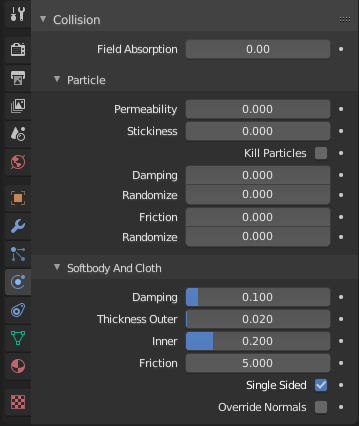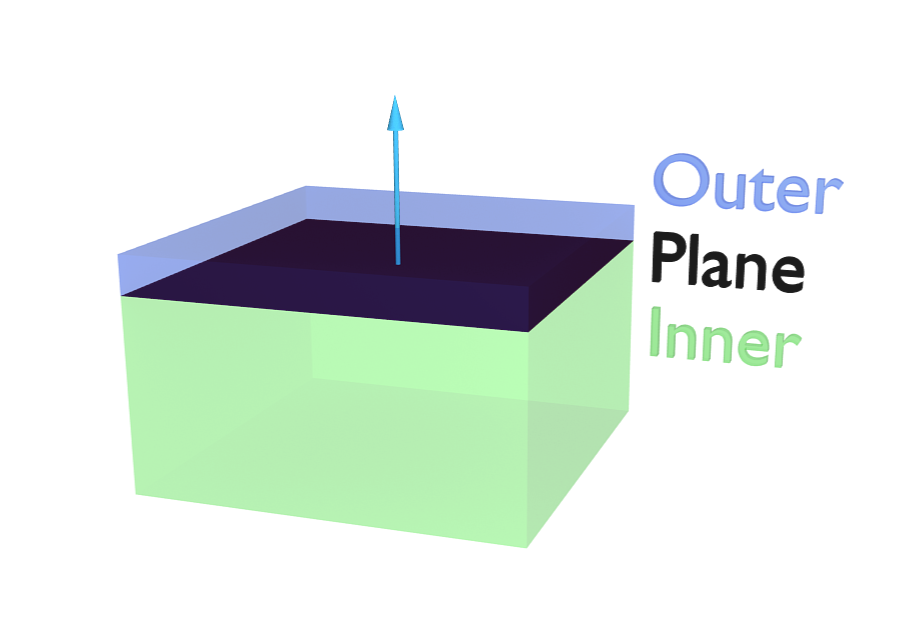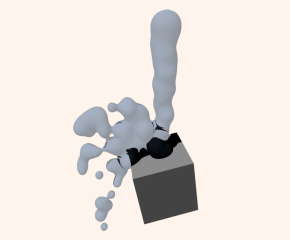Collision¶
Referência
- Mode:
Modo de Objeto
- Panel:
Partículas, Corpos macios e objetos marcados como Tecido podem colidir com outros objetos de malha. As Revoadas tentam evitar esses objetos de Colisão.
You may limit the effect on particles to a group of objects (in the Field Weights panel).
Deflection for soft body objects is difficult, they often penetrate the colliding objects.
Hair particles ignore deflecting objects (but you can animate them as soft bodies which take deflection into account).
If you change the deflection settings for an object you have to recalculate the particle, soft body or cloth system by Delete Bake, this is not done automatically.

A collider object can be temporarily disabled via an animatable toggle to the right of the button that permanently activates or deactivates it.
Opções¶

Collision panel.¶
Collision¶
- Field Absorption
A deflector can also deflect effectors. You can specify some collision/deflector objects which deflect a specific portion of the effector force using the Field Absorption value. 100% absorption results in no force getting through the collision/deflector object at all. If you have three collision object behind each other with e.g. 10%, 43% and 3%, the absorption ends up at around 50%
Partículas¶
- Permeabilidade
A fração das partículas que poderá passar através da malha.
- Adesividade
Quanto as partículas irão aderir ao objeto.
- Matar partículas
Apaga as partículas nos impactos com a malha.
- Amortecimento
O fator de amortecimento durante a colisão (independente da velocidade das partículas).
- Aleatorizar
Uma variação aleatória do amortecimento.
- Fricção
A fricção durante os movimentos ao longo da superfície.
- Aleatorizar
Uma variação aleatória da fricção.
Soft Body and Cloth¶
It is also important to note that this collision panel is used to tell all simulations that this object is to participate in colliding/deflecting other objects on a shared layer (particles, soft bodies, and cloth).
Nota
The object’s shape deforms the cloth, so the cloth simulation must be inputted the «true» shape of that mesh object at that frame. This true shape is the basis shape as modified by shape keys or armatures. Therefore, the Collision Modifier must be after any of those. The image to the right shows the Modifiers panel for the Character mesh object (not the cloth object).
- Amortecimento
Damping during a collision. The amount of bounce that the surfaces will have.
0.0 - No damping, soft bodies will have a maximum bounciness.
1.0 - Maximum damping, soft bodies will not bounce at all.
- Espessura
A padding distance is added to the inside and outside of each face, to help to prevent intersections. The soft body will come to rest at this distance away from the face of the colliding object. Outside and inside is defined by the face normal, depicted as blue arrow in Fig. A soft body vertex colliding with a plane..
- Parte externa
O tamanho da área de colisão externa.
- Parte interna
O tamanho da área de colisão interna (distância de ancoramento).

A soft body vertex colliding with a plane.¶
- Fricção
A coefficient for how slippery the cloth is when it collides with itself. For example, silk has a lower coefficient of friction than cotton.
- Single Sided
When enabled, the collider is considered to represent the boundary of a solid object rather than a thin surface, and ejects intersecting cloth in the direction of its normal.
- Override Normals
When enabled, cloth collision impulses act in the direction of the collider normals.
Nota
Soft body collisions are difficult to get perfect. If one of the objects move too fast, the soft body will penetrate the mesh. See also the section about Soft Bodies.
Examples¶

Deflected particles.¶
Here is a Meta object, using Instancing Vertices to a particle system emitting downwards, and deflected by a mesh cube.
Dicas¶
Make sure that the normals of the mesh surface are facing towards the particles/points for correct deflection. Negative scales on the object can have a similar effect. Make sure to recalculate the normals after applying the scale.
As partículas em formato de cabelos reagem diretamente aos campos de força, portanto, caso você utilize um campo de força definido para um curto alcance você não precisará necessariamente de colisões.
As partículas de cabelos evitam as suas malhas de emissão caso você as edite dentro do modo de Edição de partículas. Portanto, você poderá ao menos modelar o cabelo através das colisões.
